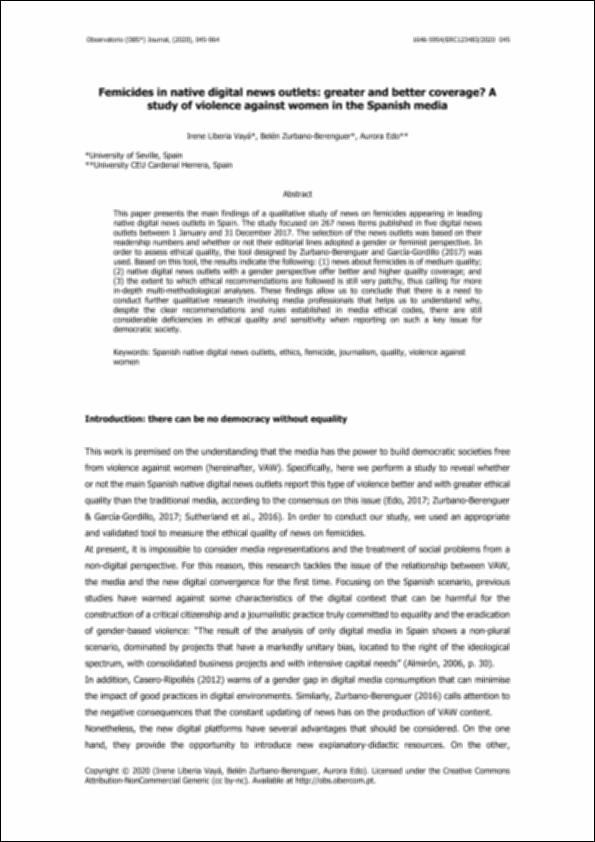Please use this identifier to cite or link to this item:
http://hdl.handle.net/10637/12783Femicides in native digital news outlets : greater and better coverage? : a study of violence against women in the Spanish media
| Title: | Femicides in native digital news outlets : greater and better coverage? : a study of violence against women in the Spanish media |
| Authors : | Liberia Vayá, Irene Zurbano Berenguer, Belén Edo Ibáñez, Aurora |
| Keywords: | Women-Abuse of - Spain.; Violencia de género - España.; Periodistas - Ética profesional - España.; Journalistic ethics - Spain.; Mujeres en los medios de comunicación social - España.; Delitos contra las mujeres - España.; Women - Violence against - Spain.; Medios digitales - Análisis de contenido - España.; Digital media - Content analysis - Spain.; Women in mass media - Spain. |
| Publisher: | OberCom. |
| Citation: | Liberia Vayá, I., Zurbano-Berenguer, B. & Edo, A. (2020). Femicides in native digital news outlets : greater and better coverage? : a study of violence against women in the Spanish media. Observatorio (OBS*), vol. 14, n. 1 (mar.), p. 45-64. DOI: https://doi.org/10.15847/obsOBS14120201516 |
| Abstract: | This paper presents the main findings of a qualitative study of news on femicides appearing in leading native digital news outlets in Spain. The study focused on 267 news items published in five digital news outlets between 1 January and 31 December 2017. The selection of the news outlets was based on their readership numbers and whether or not their editorial lines adopted a gender or feminist perspective. In order to assess ethical quality, the tool designed by Zurbano-Berenguer and García-Gordillo (2017) was used. Based on this tool, the results indicate the following: (1) news about femicides is of medium quality; (2) native digital news outlets with a gender perspective offer better and higher quality coverage; and (3) the extent to which ethical recommendations are followed is still very patchy, thus calling for more in-depth multi-methodological analyses. These findings allow us to conclude that there is a need to conduct further qualitative research involving media professionals that helps us to understand why, despite the clear recommendations and rules established in media ethical codes, there are still considerable deficiencies in ethical quality and sensitivity when reporting on such a key issue for democratic society. |
| Description: | Este artículo se encuentra disponible a texto completo en la siguiente URL: http://obs.obercom.pt/index.php/obs/article/view/1516/pdf |
| URI: | http://hdl.handle.net/10637/12783 |
| Rights : | http://creativecommons.org/licenses/by-nc/4.0/deed.es |
| ISSN: | 1646-5954 (Electrónico). |
| Issue Date: | 1-Mar-2020 |
| Center : | Universidad Cardenal Herrera-CEU |
| Appears in Collections: | Dpto. Ciencias Políticas, Ética y Sociología |
Items in DSpace are protected by copyright, with all rights reserved, unless otherwise indicated.


